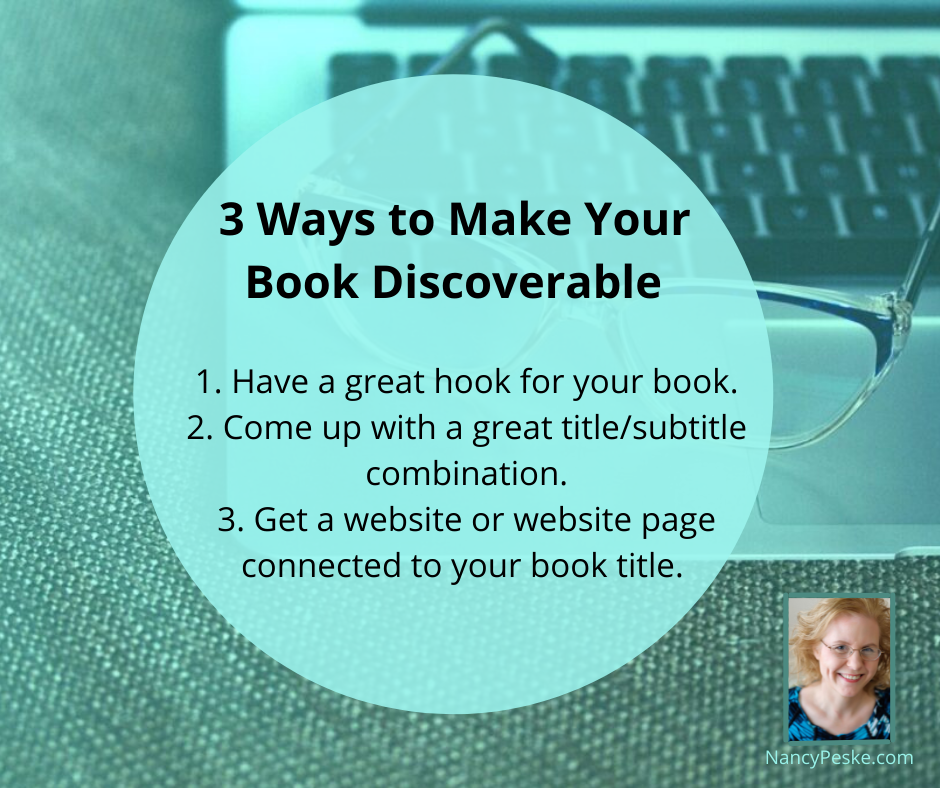3 WAYS TO MAKE YOUR BOOK DISCOVERABLE
As you write your book or make plans to, keep in mind that you’ll be more satisfied with getting your book written and published if you attract readers who will buy your book. Thinking about marketing should start early on in your process. Here are 3 ways to make your book discoverable so you can get sales when your book is launched.

Have a great hook for your book. Your hook might be a fresh take on an old topic. It could be that you’re writing about something that hasn’t been addressed in a book before. When I needed a book to help me as a parent understand, address, and accommodate my son’s sensory processing issues, I couldn’t believe there wasn’t already a parenting book on that particular topic. I had an urgent need for help getting my kiddo’s shoes on his little feet without a meltdown. Look at the comparative books to yours and find your hook, keeping in mind what’s unique about you, your story, your message, and your work. Make sure you can answer the question “Why this book now?” If you can identify a hole in the marketplace, an urgent need of readers that your book will solve, you’ll be well on your way to creating a great hook.
Discover your competition and find where you fit in. Do a Google incognito search of the internet, Amazon, and YouTube. Think about what you and your book have to offer that is better than what Siri or a simple search would lead your potential readers to. Often, the answer is “my hook and my brand.” You may feel you have a fresh take on a particular topic, but by doing a simple search of what type of information is out there, how in depth it is, and who is presenting it, you can get clearer on what your hook is.
One of my secrets is to consider how your book fulfills an urgent need some readers will have. Is what’s out there and easily available for free too cursory for them?
Do they need more help with strategies for solving a problem they have?
Do they enjoy books on a particular topic, and yours will satisfy that craving?
Put yourself in the shoes of your potential reader. Why is what they’re finding in a simple search not good enough?
Are the currently available books on the topic too long and exhaustive or too brief and even perhaps outdated?
Are your potential readers seeking encouragement, which you can provide because of your personality and the way you express yourself?
Come up with a great title/subtitle combination. A book’s title should be engaging. It must convey the hook, and often, it:
- offers a contrast (The Gifts of Imperfection; Men Are from Mars, Women Are from Venus)
- tells you how to do something challenging (How to Win Friends and Influence People, How to Talk So Kids Will Listen and Listen So Kids Will Talk)
- has shock value (The Subtle Art of Not Giving a F***, How to Stop Losing Your *** with Your Kids)
- has a play on words (Getting Past Your Past, All the Good Ones Aren’t Taken)
- has a number that promises a limit to what you have to do (The Four-Hour Workweek, The Four Agreements, 10 Percent Happier)
- has a very energetic word within it (The Power of Now, Dare to Lead, Big Magic)
- is a powerful one-word title (Quiet, Mindset, Breath)
- has a relatable quotation (It’s Not About the Coffee, That Crumpled Paper Was Due Last Week, It Didn’t Start with You)
- makes a great promise that appeals to your aspirations (Think and Grow Rich, You Are a Badass)
- makes change seem easy (Make Your Bed; Girl, Wash Your Face)
- introduces a new concept (The 5 Love Languages, Raising a Sensory Smart Child)
- entices with a secret or secrets (The Secret, The Secrets to Happiness at Work)
Notice that some titles fit into more than one category.
Your subtitle will often be more straightforward than your title and use more words. Be sure to edit down the number of words. For example, go with “Five Secrets to Managing Insecure People” instead of “Five Secrets to How You Can Better Manage People Who Are Insecure.”
Search Amazon, using Google incognito, to see what comes up under words and phrases you intend to use in your title and subtitle—and again, search YouTube and Google, too. No one was using “sensory smart” or “sensory smarts” when my coauthor and I decided to name our book Raising a Sensory Smart Child. We decided to brand around “sensory smart” and “sensory smarts” even while aiming to have our book discoverable by people using terms that are not branded, such as “sensory issues” and “sensory processing issues.” (We used “sensory processing issues” in our subtitle.)
Get a website or website page connected to your book title. If your book is The Mega Million Mindset, to make your book discoverable right away, reserve TheMegaMillionMindset.com and set up a page for your book on your author/expert website if you have one set up–a page named after the title. (This should be a dedicated page on your site where you’ll share information about your book as more info becomes available.) If the dot com for your book title isn’t available, go with a variation on your title, such as TheMegaMillionMindsetbook.com. Owning the URL for your books title and having a dedicated page for your book on your site helps with discoverability when someone is searching the internet.
Once your book is available on Amazon, your book’s page is likely to show up high on the page of a Google search for your title. However, have you considered whether it will show up on YouTube? A video with the title of your book, whether it’s a book trailer or a video of you talking about your book and showing the cover, will help with discoverability on YouTube.
Start today to make your book discoverable—yes, even before your book is written!
Need help nailing the concept and structure for your book or with writing it? Contact me and give me details about your book project.

Nancy Peske is a ghostwriter, developmental editor, and book publishing consultant who has done editorial work on books including bestsellers and award-winners for over 30 years.